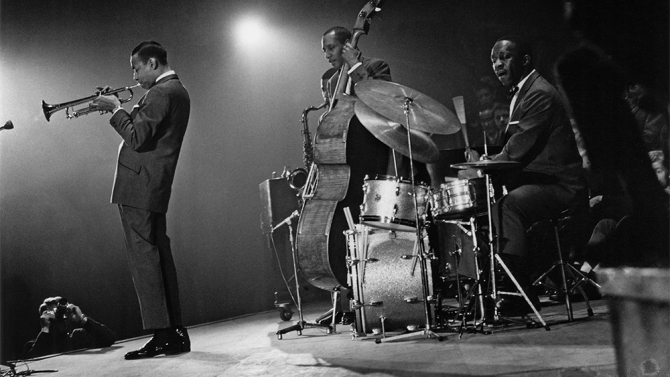
By Dwight Brown (NNPA Newswire Film Critic)
Bee Bop. Jazz. The 1950s and 1960s were a hotbed for cool music, and the hip musicians, who played those genres on records and in smoky, dimly lit nightclubs, were a special breed. Years later, most people still revere legendary trumpeters like Miles Davis and Chet Baker and are amazed by the lives they led. Time to add another artist of note to that list of iconic instrumentalists. His name is Lee Morgan. His life was as colorful and tragic; his talent as deep. This enlightening and haunting documentary gives him his due.
Credit Swedish musical documentarian Kasper Collin for reassembling the sordid pieces of Edward Lee Morgan’s’ life. Collin has had some practice. He also documented the career of American avant-garde jazz saxophonist Albert Ayler in My Name Is Albert Ayler, in 2006. He continues his tributes to lesser-known jazz artists with this absolutely spellbinding non-fiction film that plays out like a torrid novel. It tells the story of an ambitious young man, who was shepherded by the greats, fought the demons of drug addiction but was finally undone by a paramour. The story is so primal and tortured it also deserves to be a feature film starring someone like Michael B. Jordan or Nate Parker. Someone with depth.
Lee Morgan, born in Philly and a gifted trumpeter as a young adolescent, joined the Dizzy Gillespie Big Band at age 18 in the early ‘50s. Stints or guest performances with John Coltrane and Art Blakey’s Jazz Messengers further solidified his reputation in the jazz community for blowing a sweet horn. Recording around 25 records, mostly for the famed Blue Note Records label, added sheen to his career and allure. But as a musician’s life can go, he had his troubles. An addiction to drugs got him kicked out of Blakey’s band. He was broke, homeless and often sold his worldly possessions for a fix. Heroin.
The stabilizing force in Morgan’s increasingly harrowing life was a magnanimous older woman named Helen. She fed him, put a roof over his head, was his ardent lover, and his biggest fan. If Morgan regained his footing at all, it was because of her unwavering support. She loved him with all her heart, but not unconditionally. She had her pride. When Morgan turned his attention to a younger lover, his common-law-wife was not about to take it on the chin. She had a plan—and a gun.
Reconstructing Lee Morgan’s bio through old interviews with Morgan, anecdotes from jazz greats like Wayne Shorter, photos and archival footage vividly recreates the jazz age and the trumpeter’s travails. The most soul-crushing recollections, however, come from Helen herself. Her stories can be heard on an audio cassette interview that was arranged by a night school teacher who was intrigued to find out that one of his students did a stint in prison for committing perhaps one of the most heinous acts of violence in the jazz world.
Hearing Helen recall the ups and downs of her relationship that left her in an emotional fog is like hearing an old jazz 78rpm record that is so scratched you can barely make out the tune, but you do. Everything you hear and see leads up to an ill-fated, cold wintry New York City night in 1972. Performers and an audience are gathered at an East Village jazz bar. Morgan is there with a girl on his arm. A shot rings out. An irrevocable crime of passion occurs. Time stands still. People live or die with the consequences.
Kasper Collin has assembled a top-notch tech crew for this urban tale. The splendid cinematography of Bradford Young (Arrival, Selma) recreates scenes with the artistry of a painter. Editing by Collins with the help of Hanna Lejonqvist, Eva Hillström and Dino Jonsäter make you feel like a picture book has come alive, reeling out photos with a rhythm as precise yet eclectic as a jazz score.
Watch “I Called Him Morgan,” and you will sit enraptured. Morgan’s music and Helen’s foggy memories will take your breath away.
It’s an amazing coda to a jazz musician’s life. It’s the encore Morgan never had the chance to do.
An exceptional documentary. Haunting.
Dwight Brown is a film critic and travel writer. As a film critic, he regularly attends international film festivals including Cannes, Sundance, Toronto and the American Black Film Festival. Read more movie reviews by Dwight Brown here and at DwightBrownInk.com.

